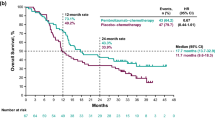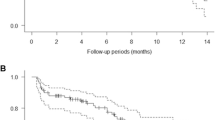Abstract
Malignant ascites and pleural effusion are challenging clinical problems, with a major impact on quality of life. We conducted a randomized phase II trial to assess the palliative value of cediranib, an oral vascular endothelial growth factor tyrosine kinase inhibitor (VEGF TKI). After a baseline paracentesis or thoracentesis (on day 0), patients with symptomatic malignant ascites and/or pleural effusion were randomized between immediate treatment with cediranib (Immediate Cediranib) or delayed treatment with cediranib (Delayed Cediranib) on day 29, or after a new puncture was needed. The primary objective of the study was the puncture-free survival, defined as the time from study start (day 1) to the first need for paracentesis or thoracentesis, or time to death, whichever event occurred first. Twelve patients were enrolled. The median puncture-free survival was 45 days (range 10–368) in the Immediate Cediranib patients and 7 days (range 4–13) in the Delayed Cediranib patients (P = 0.011). The change in puncture-free interval (the puncture-free survival after study start minus the puncture-free interval before study start) increased with a median of 31 days in the Immediate Cediranib patients and shortened with a median of 3 days in the Delayed Cediranib patients (P = 0.015). The most common adverse events were fatigue and anorexia. In conclusion, cediranib increased the puncture-free survival and puncture-free interval with an acceptable toxicity profile. This is the first study in which an oral VEGFR TKI showed beneficial palliative effects in patients with malignant effusions.


Similar content being viewed by others
References
Ayantunde AA, Parsons SL (2007) Pattern and prognostic factors in patients with malignant ascites: a retrospective study. Ann Oncol 18:945–949
Martinez-Moragon E, Aparicio J, Sanchis J, Menéndez R, Cruz Rogado M, Sanchis F (1998) Malignant pleural effusion: prognostic factors for survival and response to chemical pleurodesis in a series of 120 cases. Respiration 65:108–113
Heffner JE, Klein JS (2008) Recent advances in the diagnosis and management of malignant pleural effusions. Mayo Clin Proc 83:235–250
Becker G, Galandi D, Blum HE (2006) Malignant ascites: systematic review and guideline for treatment. Eur J Cancer 42:589–597
Sack U, Hoffmann M, Zhao XJ, Chan KS, Hui DS, Gosse H, Engelmann L, Schauer J, Emmrich F, Hoheisel G (2005) Vascular endothelial growth factor in pleural effusions of different origin. Eur Respir J 25:600–604
Zebrowski BK, Liu W, Ramirez K, Akagi Y, Mills GB, Ellis LM (1999) Markedly elevated levels of vascular endothelial growth factor in malignant ascites. Ann Surg Oncol 6:373–378
Kraft A, Weindel K, Ochs A, Marth C, Zmija J, Schumacher P, Unger C, Marmé D, Gastl G (1999) Vascular endothelial growth factor in the sera and effusions of patients with malignant and nonmalignant disease. Cancer 85:178–187
Verheul HM, Hoekman K, Jorna AS, Smit EF, Pinedo HM (2000) Targeting vascular endothelial growth factor blockade: ascites and pleural effusion formation. Oncologist 5(Suppl 1):45–50
Wedge SR, Kendrew J, Hennequin LF, Valentine PJ, Barry ST, Brave SR, Smith NR, James NH, Dukes M, Curwen JO, Chester R, Jackson JA, Boffey SJ, Kilburn LL, Barnett S, Richmond GH, Wadsworth PF, Walker M, Bigley AL, Taylor ST, Cooper L, Beck S, Jürgensmeier JM, Ogilvie DJ (2005) AZD2171: a highly potent, orally bioavailable, vascular endothelial growth factor receptor-2 tyrosine kinase inhibitor for the treatment of cancer. Cancer Res 65:4389–4400
Drevs J, Siegert P, Medinger M, Mross K, Strecker R, Zirrgiebel U, Harder J, Blum H, Robertson J, Jürgensmeier JM, Puchalski TA, Young H, Saunders O, Unger C (2007) Phase I clinical study of AZD2171, an oral vascular endothelial growth factor signaling inhibitor, in patients with advanced solid tumors. J Clin Oncol 25:3045–3054
Mulders P, Hawkins R, Nathan P, de Jong I, Osanto S, Porfiri E, Protheroe A, van Herpen CM, Mookerjee B, Pike L, Jürgensmeier JM, Gore ME (2012) Cediranib monotherapy in patients with advanced renal cell carcinoma: results of a randomized phase II study. Eur J Cancer 48:527–537
Matulonis UA, Berlin S, Ivy PK, Krasner C, Zarwan C, Berkenblit A, Campos S, Horowitz N, Cannistra SA, Lee H, Lee J, Roche M, Hill M, Whalen C, Sullivan L, Tran C, Humphreys BD, Penson RT (2009) Cediranib, an oral inhibitor of vascular endothelial growth factor receptor kinases is an active drug in recurrent epithelial ovarian, fallopian tube, and peritoneal cancer. J Clin Oncol 27:5601–5606
Grebenchtchikov N, Sweep CG, Geurts-Moespot A, Piffanelli A, Foekens JA, Benraad TJ (2002) An ELISA avoiding interference by heterophilic antibodies in the measurement of components of the plasminogen activation system in blood. J Immunol Methods 268:219–231
Span PN, Grebenchtchikov N, Geurts-Moespot J, Westphal JR, Lucassen AM, Sweep CG (2000) EORTC receptor and biomarker study group report: a sandwich enzyme-linked immunosorbent assay for vascular endothelial growth factor in blood and tumor tissue extracts. Int J Biol Markers 15:184–191
Eisenhauer EA, Therasse P, Bogaerts J, Schwartz LH, Sargent D, Ford R, Dancey J, Arbuck S, Gwyther S, Mooney M, Rubinstein L, Shankar L, Dodd L, Kaplan R, Lacombe D, Verweij J (2009) New response evaluation criteria in solid tumours: revised RECIST guideline (version 1.1). Eur J Cancer 45:228–247
Parsons S, Hennig M, Linke A et al (2009) Clinical benefit of catumaxomab in malignant ascites in patients subpopulations in a pivotal phase II/III trial. J Clin Oncol 27(Suppl):(Abstr e 1400)
Hoff PM, Hochhaus A, Pestalozzi BC, Tebbutt NC, Li J, Kim TW, Koynov KD, Kurteva G, Pintér T, Cheng Y, van Eyll B, Pike L, Fielding A, Robertson JD, Saunders MP (2012) Cediranib plus FOLFOX/CAPOX versus placebo plus FOLFOX/CAPOX in patients with previously untreated metastatic colorectal cancer: a randomized, double-blind, phase III study (HORIZON II). J Clin Oncol 30:3596–3603
Schmoll HJ, Cunningham D, Sobrero A, Karapetis CS, Rougier P, Koski SL, Kocakova I, Bondarenko I, Bodoky G, Mainwaring P, Salazar R, Barker P, Mookerjee B, Robertson J, Van Cutsem E (2012) Cediranib with mFOLFOX6 versus bevacizumab with mFOLFOX6 as first-line treatment for patients with advanced colorectal cancer: a double-blind, randomized phase III study (HORIZON III). J Clin Oncol 30:3588–3595
Heiss MM, Murawa P, Koralewski P, Kutarska E, Kolesnik OO, Ivanchenko VV, Dudnichenko AS, Aleknaviciene B, Razbadauskas A, Gore M, Ganea-Motan E, Ciuleanu T, Wimberger P, Schmittel A, Schmalfeldt B, Burges A, Bokemeyer C, Lindhofer H, Lahr A, Parsons SL (2010) The trifunctional antibody catumaxomab for the treatment of malignant ascites due to epithelial cancer: results of a prospective randomized phase II/III trial. Int J Cancer 127:2209–2221
Sebastian M, Kiewe P, Schuette W, Brust D, Peschel C, Schneller F, Rühle KH, Nilius G, Ewert R, Lodziewski S, Passlick B, Sienel W, Wiewrodt R, Jäger M, Lindhofer H, Friccius-Quecke H, Schmittel A (2009) Treatment of malignant pleural effusion with the trifunctional antibody catumaxomab (Removab) (anti-EpCAM × Anti-CD3) results of a phase 1/2 study. J Immunother 32:195–202
Colombo N, Mangili G, Mammoliti S, Kalling M, Tholander B, Sternas L, Buzenet G, Chamberlain D (2011) A phase II study of aflibercept in patients with advanced epithelial ovarian cancer and symptomatic malignant ascites. Gynecol Oncol 125:42–47
Gotlieb WH, Amant F, Advani S, Advani S, Goswami C, Hirte H, Provencher D, Somani N, Yamada SD, Tamby JF, Vergote I (2012) Intravenous aflibercept for treatment of recurrent symptomatic malignant ascites in patients with advanced ovarian cancer: a phase 2, randomized, double-blind, placebo-controlled study. Lancet Oncol 13:154–162
Holash J, Davis S, Papadopoulos N, Croll SD, Ho L, Russell M, Boland P, Leidich R, Hylton D, Burova E, Ioffe E, Huang T, Radziejewski C, Bailey K, Fandl JP, Daly T, Wiegand SJ, Yancopoulos GD, Rudge JS (2002) VEGF-Trap: a VEGF blocker with potent antitumor effects. Proc Natl Acad Sci U S A 99:11393–11398
Diaz JP, Tew WP, Zivanovic O, Konner J, Sabbatini PJ, dos Santos LA, Abu-Rustum NR, Chi DS, Aghajanian C, Barakat RR (2010) Incidence and management of bevacizumab-associated gastrointestinal perforations in patients with recurrent ovarian carcinoma. Gynecol Oncol 116:335–339
Acknowledgments
The authors thank all the patients for participating in this study and acknowledge the statistical contributions of Rogier A.R.T. Donders and the assistance with patient-management of Michiel Kerkkamp and Mirjam G.W. Arens-van der Logt.
Funding
Cediranib was provided by AstraZeneca for this investigator-initiated study. Funding for this study was provided by the Dutch Cancer Society and the Dr. Paul Speth Foundation.
Conflict of Interest
None
Author information
Authors and Affiliations
Corresponding author
Rights and permissions
About this article
Cite this article
Mulder, S.F., Boers-Sonderen, M.J., van der Heijden, H.F.M. et al. A phase II study of cediranib as palliative treatment in patients with symptomatic malignant ascites or pleural effusion. Targ Oncol 9, 331–338 (2014). https://doi.org/10.1007/s11523-014-0306-0
Received:
Accepted:
Published:
Issue Date:
DOI: https://doi.org/10.1007/s11523-014-0306-0




